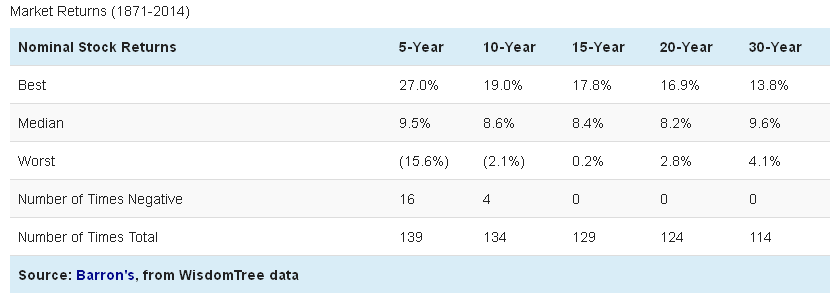Apparently, the price you pay doesn’t matter because stocks always rise over the long term.
Or at least that was the message Barron’s sent over the weekend (see Why the Market Will Keep Climbing). Looking at stock returns back to 1871, Barron’s found that of the 139 five-year periods, only 16 had negative returns. Adjusting for inflation it was more like 25, but still a very low number. There were no 15-year stretches without positive returns, unless you adjust for inflation–in which case there were only three. And over 20- and 30-year periods, stocks were always profitable, inflation adjusted or not.
Market Returns (1871-2014)

I read Barron’s every Saturday morning. It’s part of my regular weekly ritual, and as a general rule I find the magazine to be sober and balanced. But this is shoddy analysis, and I would argue that it’s irresponsible to print. Where do I even start picking this apart. I suppose we should start with the time periods involved. 1871? Really?
Think about that for a minute. That’s six years after the Civil War. How many stocks traded publically in 1871, and how many Americans had access to them? The answer is “not many,” and certainly not enough to draw meaningful conclusions about returns. Assuming price data from that period is accurate–which is a stretch–stocks were not the liquid investments back then that we know today.
There were no mutual funds back then…no 401k plans…and certainly no online brokers. Most Americans measured their wealth in acres of farmland owned, not shares of stock. And in any event, prior to the 1920's the United States was what we would think of today as an “emerging market,” with higher risk and higher expected returns built into prices.
Stocks did not become a mainstream investment vehicle until maybe the 1920's. The first modern mutual fund–the Massachusettes Investors’ Trust–was created in 1924. But mutual funds–and stock market ownership in general–did not really go mainstream until the 1950s. And you could make an argument that mainstream investing as we know it today started in 1978 with the creation of the 401k plan. And the regulatory regime as we think of it today didn’t exist until the Great Depression.
Being generous, we could say that meaningful data starts in the 1920s. This would mean that more than a third of the data used to build the chart above is meaningless.
And what about dividends? Dividends are included in the historical returns. The only problem is that today, the S&P 500 yields 1.88%, or less than half the 4.35% median dividend yield going back to 1871. As recently as the 1980s, dividend yields were north of 6%.
Along the same lines we have bond yields and inflation. The great bull market of 1982 to 2000 came on the back of the “great moderation” in inflation and interest rates. Now in 2015, bond yields are near all-time lows. At best–and this is the scenario I see–we could see bond yields trade sideways for several years. But they certainly can’t go materially lower from today’s levels. So, any sustained bull market starting from today will not enjoy the powerful tailwinds of falling yields that we’ve gotten used to over the past 32 years.
And finally–and arguably most importantly–we have price. Stocks today are expensive. As in really expensive. The S&P 500 trades for 27 times cyclically-adjusted (i.e. 10-year) earnings. That puts it fully 62.7% higher than its long-term average and implies returns over the next eight years of just 0.4% per year. And that’s the nominal expected return, as in not adjusted for inflation. So yes, while these are positive returns, they’re certainly nothing to get excited about.
You know the caveat: past performance is no guarantee of future results. My criticism of the dated Barron’s data could be equally applied to the CAPE data I used above. And I should also point out that I’m not a congenital bear. I’m actually still very heavily invested in stocks, although my focus has shifted to cheaper overseas markets and to higher-yielding investments here, such as mortgage REITs and business development companies.
